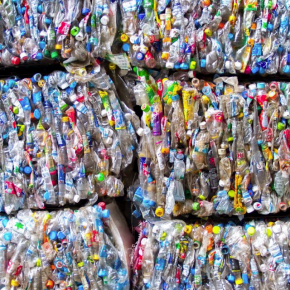
Axion: business models for recycling are changing for the better
Changing business models for plastic recycling could lead to more profitable businesses, higher grade material on the market and make investment in recycling infrastructure more viable, suggests Axion.
A shift away from the ‘traditional’ recycling business model could possibly open up market opportunities for ‘lower quality’ recyclate, such as that from flexible plastics, according to Richard McKinlay, Axion’s Head of Circular Economy.
He commented: “Business models for recycling are changing, and in a beneficial way. The sector is shifting away from the ‘old style’ recycling model of ‘buy waste, process it, sell flake/commodity compound’.”
Richard has identified shifts towards two distinct operational models. Some companies are controlling the waste, using it as infeed and producing recyclate from that; along the lines of Axion Polymers’ extraction and processing of plastics from end-of-life vehicles at its Manchester-based SWAPP facility.
Others are becoming an ‘end user’ – buying in waste before converting that into a secondary raw material used in their own products.
Fluctuations in infeed or output prices cause difficulties for recyclers. In an ideal world, Richard stresses companies would collect plastic waste directly from households, process it and use the recyclate in new products.
Welcoming the current trend towards investment in or takeovers of recycling businesses by large petrochemical firms, he added: “This is positive news as they bring stable financial backing and access to an existing customer base, alongside valuable polymer science knowledge and R&D capabilities. All this can aid growth and further development in recycling capability.”
Targeting higher-value markets is another trend that is boosting the recycling sector. Rather than selling HDPE for piping, for example, firms are improving the quality and selling it for more demanding applications, such as packaging.
Richard thinks this gap in supply of lower-grade recyclate could be filled by flexible packaging recycling.
He commented: “With a proposed tax on packaging with less than 30% recycled content, there will be a significant increase in demand for high quality material, potentially giving recycled compounds a higher market price than virgin.
“This should shift recyclate from packaging up the quality ladder, moving it away from applications such as pipes and transport and logistic packaging.
“This movement of recyclate could then open a gap in the market from “lower grade” recycled polymers, such as that produced from flexible packaging.
“With competition from higher grade HDPE and PP removed, compounds from flexibles could be supplied into these markets, improving the economic argument for recycling flexibles.”
This trend is likely to be stimulated by brand managers needing to incorporate more recycled content for marketing purposes.
In conclusion, Richard believes an ‘interesting’ shift in the nature of recycling business models could create a new era in the applications of recyclable materials, as well as one in which successful companies can thrive.
Twitter: @axion_group
LinkedIn: Axion Group
Contact Axion: info@axiongroup.co.uk
Visit Supplier's page
Latest news

28th March 2025
Ideal Heating Commercial announces 10-year warranty on Evomax 2 boiler
Evomax 2, the UK’s number one selling commercial wall-mounted boiler from Ideal Heating Commercial, is now available with a 10-year warranty.
Posted in Articles, Building Industry News, Building Products & Structures, Building Regulations & Accreditations, Building Services, Facility Management & Building Services, Heating Systems, Controls and Management, Heating, Ventilation and Air Conditioning - HVAC, Innovations & New Products, Pipes, Pipes & Fittings, Plumbing, Retrofit & Renovation, Sustainability & Energy Efficiency, Videos
28th March 2025
FLIR Si1-LD Acoustic Imaging Camera for Compressed Air Leak Detection
FLIR, a Teledyne Technologies company, introduces the Si1-LD, an industrial acoustic imaging camera that brings faster and more accurate compressed air leak detection to those operating on a modest condition monitoring budget.
Posted in Acoustics, Noise & Vibration Control, Articles, Building Industry News, Building Products & Structures, Building Services, Facility Management & Building Services, Information Technology, Innovations & New Products, Retrofit & Renovation, Sustainability & Energy Efficiency, Thermal Imaging and Monitors
28th March 2025
LIFTEX 2025 Seminar programme announced
Registration has opened for LIFTEX 2025. Now in its 37th year, LIFTEX 2025 is the UK’s only dedicated exhibition for the lift, escalator and access industry and takes place only once every three years.
Posted in Access Control & Door Entry Systems, Accessibility, Articles, Building Industry Events, Building Industry News, Building Products & Structures, Building Regulations & Accreditations, Building Services, Exhibitions and Conferences, Facility Management & Building Services, Health & Safety, Retrofit & Renovation, Security and Fire Protection, Seminars
28th March 2025
MCRMA welcomes ArcelorMittal UK to membership
A UK division of the global steelmaking business ArcelorMittal has become the latest new member of the MCRMA, the industry association representing the metal building envelope sector.
Posted in Articles, Building Associations & Institutes, Building Industry News, Building Products & Structures, Building Systems, Cladding, Facades, Posts, Restoration & Refurbishment, Retrofit & Renovation, Roofs, Steel and Structural Frames, Walls
 Sign up:
Sign up: